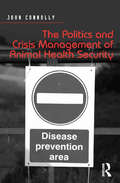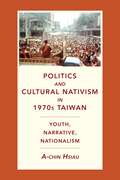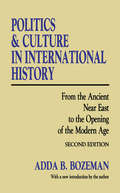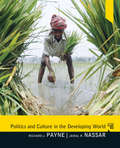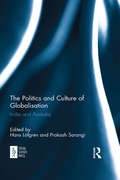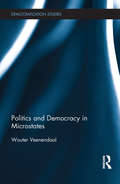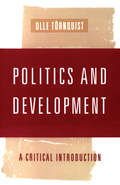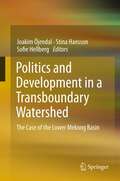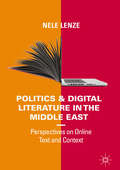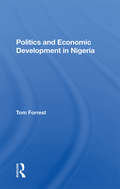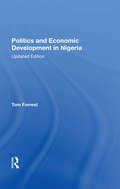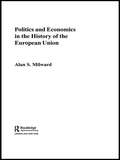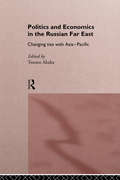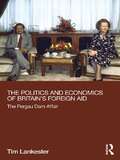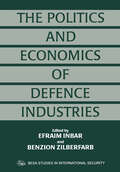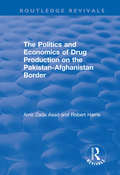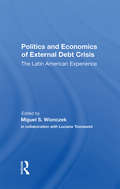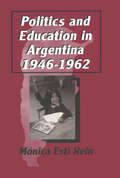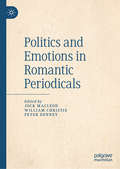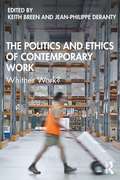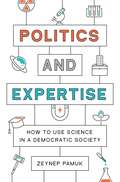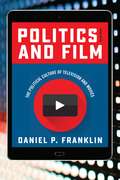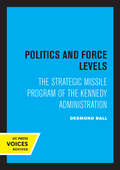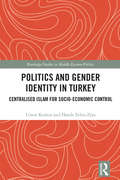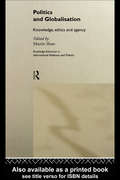- Table View
- List View
The Politics and Crisis Management of Animal Health Security
by John ConnollyThe Politics and Crisis Management of Animal Health Security addresses the 2001 foot and mouth epidemic in the United Kingdom - one of, if not the, most significant crises ever to face the UK farming industry. Underpinned by interviews with politicians and bureaucrats and with significant primary documentary analysis the book shows that the crisis was a critical juncture in how disease outbreaks have been planned and managed ever since. The author explores how this event affected policy and governance arrangements for managing subsequent disease-induced threats (such as avian influenza and bovine TB) and concludes by considering the ’temporality’ of lesson learning by the UK government including the current and future challenges associated with managing incongruent risks (e.g., flood protection, swine flu and Ebola). This book provides students of public policy and administration with a significant illustration of how key concepts and analytical lenses from public policy can be applied to the study of the contours of practical policy change.
Politics and Cultural Nativism in 1970s Taiwan: Youth, Narrative, Nationalism (Global Chinese Culture)
by A-chin HsiauIn the aftermath of 1949, Taiwan’s elites saw themselves as embodying China in exile both politically and culturally. The island—officially known as the Republic of China—was a temporary home to await the reconquest of the mainland. Taiwan, not the People’s Republic, represented China internationally until the early 1970s. Yet in recent decades Taiwan has increasingly come to see itself as a modern nation-state.A-chin Hsiau traces the origins of Taiwanese national identity to the 1970s, when a surge of domestic dissent and youth activism transformed society, politics, and culture in ways that continue to be felt. After major diplomatic setbacks at the beginning of the 1970s posed a serious challenge to Kuomintang authoritarian rule, a younger generation without firsthand experience of life on the mainland began openly challenging the status quo. Hsiau examines how student activists, writers, and dissident researchers of Taiwanese anticolonial movements, despite accepting Chinese nationalist narratives, began to foreground Taiwan’s political and social past and present. Their activism, creative work, and historical explorations played pivotal roles in bringing to light and reshaping indigenous and national identities. In so doing, Hsiau contends, they laid the basis for Taiwanese nationalism and the eventual democratization of Taiwan.Offering bracing new perspectives on nationalism, democratization, and identity in Taiwan, this book has significant implications spanning sociology, history, political science, and East Asian studies.
Politics and Culture in International History: From the Ancient Near East to the Opening of the Modern Age
by Adda B. BozemanThe current political conflicts in Somalia and Russia make the reappearance of this book as relevant as ever. Politics and Culture in International History illumines world politics by identifying the causes of conflict and war and assessing the validity of schemes for peace and unity. Bozeman maintains that political systems are grounded in cultures; thus, international relations are by definition hitercultural relations. She deals exclusively with the thought patterns of the world's literate civilizations and societies between the fourth millenium B.C. and the fifteenth century A.D.In a substantial new introduction, Bozeman analyzes world politics over the last half century, showing how the interplay of politics and culture has intensified. She notes that the world's assembly of states is no longer held together by substantive accords on norms, purposes, and values, but by loose agreements on the use offorms, techniques, and words. The causes and effects of these changes between the 1950s and 1990s are assayed by Bozeman.
Politics and Culture in the Developing World
by Richard J Payne Jamal NassarFrom decolonization and democratization to religion and gender, Politics and Culture in the Developing World is a comprehensive survey of the global context of development. With in-depth and current examples from Asia, Africa, Latin America, and the Middle East., this text examines the central political themes in the developing world. Throughout, Politics and Culture in the Developing World demonstrates how globalization both accelerates change and increases interdependence between developing and developed countries.
The Politics and Culture of Globalisation: India and Australia
by Hans Löfgren Prakash SarangiWe experience the culture of globalisation every time we visit a Tandoori restaurant in Chicago, or a Pizza Hut in Hyderabad, or as we watch Bollywood films in Australia. Globalisation is a label used for a wide range of political, social and cultural phenomena, many of which are explored in this volume. The Politics and Culture of Globalisation: India and Australia brings together Indian and Australian experts in the fields of political science, international relations, philosophy, cultural theory and political economy. Its timeliness and unifying theme derive from comparisons between Indian and Australian perspectives, and analyses by Australian writers on developments in India. Indian-Australian relations are explored in several chapters. The neo-liberal form of globalisation is a key focus of critique in this volume. Several chapters examine the search for alternative forms of governance as the nation-state undergoes profound change due to global interconnectedness.
Politics and Democracy in Microstates (Democratization and Autocratization Studies)
by Wouter VeenendaalWhy are small states statistically more likely to have a democratic political system? By addressing this question from a qualitative and comparative methodological angle, this book analyses the effects of a small population size on political competition and participation. By comparing the four microstates of San Marino (Europe), St. Kitts and Nevis (Caribbean), Seychelles (Africa), and Palau (Oceania), it provides fresh and stimulating insight, concluding that the political dynamics of microstates are not as democratic as commonly believed. Instead, it is found in all four cases that smallness results in personalistic politics, dominance of the political executive, patron-client relations between citizens and politicians, and the circumvention of formal political institutions. In addition, the book suggests that the study of formal institutions provides an incomplete image of microstate democracy and that informal characteristics of politics in microstates also need to be explored in order to better explain the influence of smallness on democracy. This book will be of key interest to scholars and students of democracy, democratization, regional and decentralization studies and comparative politics.
Politics and Development: A Critical Introduction
by Olle TörnquistThis major textbook provides a clear and comprehensive introduction to the main analytical approaches and their use in the study of third world politics and development. The author outlines the difficulties in the various analytical approaches to the study of development within political science; presents a critical overview of each of the main schools of thought and explores the contemporary issue of democratization to illustrate how students can apply a framework for research and critically develop a perspective on their own.
Politics and Development in a Transboundary Watershed
by Joakim Öjendal Sofie Hellberg Stina HanssonWater - and its governance - is becoming a global concern partly because it is turning into a goods in short supply, with devastating effects on literally billions of people, but also because it is the "carrier" of global warming; whether through irregular weather patterns or through flooding, water is how global warming will be 'felt'. The lion's share of the globally available fresh water resources is to be found in transboundary systems. In spite of its significance, the generated knowledge on how to deal with transboundary waters is weak and leaves policy makers with seemingly unavoidable, trade-off dilemmas and prioritizations, often with detrimental effects. In order to disentangle this predicament this volume works with one case: the Lower Mekong Basin and covers state-of-the-art academic and practitioners' knowledge and hence appeals to a wide audience. The topic this volume addresses is situated in the nexus of an IR- (International Relations) approach focussing on transboundary politics and its inclination to remain within the sphere of state sovereignty and national interest on the one hand, and Development studies, with its imperatives on participation, planning, and intervention, on the other. The dilemma, we argue, of better understanding transboundary water management lies in how to understand how these two rationalities can be simultaneously nurtured. Audience: This book will be relevant to scholars, as it provides cutting-edge research, and students, since it covers the primary debates in the field, interested in resource management, regional politics, and development issues in the area. It also addresses the global debate on transboundary water management and presents an in-depth case of one of the globally most sophisticated attempts at pursuing sustainable river basin management. Finally, practitioners and policymakers would benefit greatly because all contributions have explicit policy relevance, launching suggestion on improvements in water management.
Politics and Digital Literature in the Middle East: Perspectives On Online Text And Context
by Nele LenzeDuring the 2000's, online literature in Arabic language was popular among a larger readership. Writings on subjects dealing with politics, globalization, and social matters gained are well-received. While mapping the genre, this monograph shows literary developments in print and digital during these peak years to provide a historical context for the material. Online literary culture is linked to social, economic, and political developments within the last two decades. This book presents the differences between online and print literature as it relates to writer-readership interaction, literary quality, language and style, critical reception, and circulation. The geographic location of the analysis focuses on Gulf countries featuring a comparative study of Egypt and Lebanon.
Politics And Economic Development In: Updated Edition
by Tom ForrestSince the end of civil war in 1970, Nigeria has struggled to build a stronger federal center and to reduce conflicts that have arisen from uneven development and from ethnic, regional, class and religious differences. This book provides a comprehensive account of the dynamic interplay between the political and economic forces that have shaped gover
Politics And Economic Development In Nigeria: Updated Edition
by Tom ForrestThis text provides an account of the dynamic interplay between the political and economic forces that have shaped government priorities and strategies in Africa's most populous country. The author examines efforts to build a stronger federal centre, to develop national policies, to counter uneven development, and to reduce conflicts that have arisen from ethnic, regional, class and religious differences. A final section analyzes the evolution of economic policy and performance, looking specifically at agrarian policy, the programme of economic liberalization, and the impact of oil revenues.
Politics and Economics in the History of the European Union (The Graz Schumpeter Lectures)
by Alan MilwardThe Graz-Schumpeter annual lectures have grown in reputation over the years with impressive figures from academia such as Ian Steedman, J. Stanley Metcalfe and Duncan K. Foley contributing their own impressive series of lectures. The books produced as a result of these lectures are no less impressive and this latest volume from Alan Milward is a typically authoritative read.
Politics and Economics in the Russian Far East: Changing Ties with Asia-Pacific
by Tsuneo AkahaPolitics and Economics in the Russian Far East addresses the key issue of what the Russian Far East and its Northeast Asian neighbours can do to further closen economic and co-operative relationships. The question of to what extent the state should intervene to stimulate economic growth in the Russian Far East is covered, as are the options for a more laissez-faire approach. The possibilities for economic co-operation with the more successful market economies of the region are discussed as are the problems and opportunities presented by the exploitation of Russia's vast natural resources.This book will be essential reading for all those wishing to obtain a deeper understanding of the complexity of the issues involved in the development of co-operative relationships between Russia and its Asia-Pacific neighbours.
The Politics and Economics of Britain's Foreign Aid: The Pergau Dam Affair (Routledge Explorations in Development Studies)
by Tim LankesterThe Pergau dam in Malaysia was the most controversial project in the history of British aid. Because of its high cost, it was a poor candidate for aid funding. It was provided in part to honour a highly irregular promise of civil aid in connection with a major arms deal. After two parliamentary inquiries and intense media coverage, in a landmark judgement the aid for Pergau was declared unlawful. Tim Lankester offers a detailed case study of this major aid project and of government decision-making in Britain and Malaysia. Exposing the roles played by key politicians and other stakeholders on both sides, he analyses the background to the aid/arms linkage, and the reasons why the British and Malaysian governments were so committed to the project, before exploring the response of Britain’s Parliament, and its media and NGOs, and the resultant legal case. The main causes of the Pergau debacle are carefully drawn out, from conflicting policy agendas within the British government to the power of the business lobby and the inability of Parliament to provide any serious challenge. Finally, Lankester asks whether, given what was known at the time and what we know now, he and his colleagues in Britain’s aid ministry were correct in their objections to the project. Pergau is still talked about as a prime example of how not to do aid. Tim Lankester, a key figure in the affair, is perfectly placed to provide the definitive account. At a time when aid budgets are under particular scrutiny, it provides a cautionary tale.
The Politics and Economics of Defence Industries
by Efraim Inbar Benzion ZilberfarbThis volume provides a policy-relevant analysis of the complex web of contemporary economic trends, political developments and strategic considerations that are shaping the contours of the new post-Cold War world market for weaponry.
The Politics and Economics of Drug Production on the Pakistan-Afghanistan Border
by Amir Zada Asad Robert HarrisThis title was first published in 2003. This important study contains a detailed socio-economic and political description of a region where opium and heroin are both produced and consumed. By carefully relating drug production, trade and consumption to a relatively inaccessible area on the Pakistan-Afghanistan border, the book teaches us not only about the area - itself fascinating enough, particularly since it came into global prominence following the terrorist attack of 11 September 2001 - but also about the global dimensions of the problem.
Politics And Economics Of External Debt Crisis: The Latin American Experience
by Miguel S. Wionczek Luciano TomassiniSince 1981 Latin America has been in the midst of a protracted external debt crisis due, among other reasons, to emergency borrowing at record-high real interest rates and the decline in the region's export proceeds. Until now, most literature on the subject originated in industrial lender countries, whose primary concern is the impact of the debt
Politics and Education in Argentina, 1946-1962
by Monica ReinThis study focuses on the formal education system in Argentina during the 1940s, the 1950s, and the early 1960s. It analyzes the link between politics and education against the backdrop of changing social conditions in Argentina under the regimes of Peron, Lonardi and Aramburu (the Liberating Revolution), and Frondizi, by evaluating textbooks, official bulletins, childrens' periodicals, speeches, and personal interviews.
Politics and Emotions in Romantic Periodicals
by Jock Macleod William Christie Peter DenneyThis book comprises eleven essays by leading scholars of early nineteenth-century British literature and periodical culture. The collection addresses the many and varied links between politics and the emotions in Romantic periodicals, from the revolutionary decade of the 1790s, to the 1832 Reform Bill. In so doing, it deepens our understanding of the often conflicted relations between politics and feelings, and raises questions relevant to contemporary debates on affect studies and their relation to political criticism. The respective chapters explore both the politics of emotion and the emotional register of political discussion in radical, reformist and conservative periodicals. They are arranged chronologically, covering periodicals from Pigs’ Meat to Blackwood’s Edinburgh Magazine and the Spectator. Recurring themes include the contested place of emotion in radical political discourse; the role of the periodical in mediating action and performance; the changing affective frameworks of cultural politics (especially concerning gender and nation), and the shifting terrain of what constitutes appropriate emotion in public political discourse.
The Politics and Ethics of Contemporary Work: Whither Work?
by Keith Breen Jean-Philippe DerantyBringing together leading international scholars within the fields of social and political theory and philosophy, this book explores how we should understand work and its role(s) in our lives and wider society. What challenges are posed by work in our changing economy and the new economic forms that are beginning to emerge, and how can we best address these challenges? In what ways do patterns of working, as well as work technologies, shape people’s lives within and outside work, in particular their life opportunities and their social and natural environment? How might we organize—or seek to reorganize—workplaces so that the experience of work better reflects our shared ethical ideals and normative principles? This volume examines these vital questions in a comprehensive and systematic manner in order to provide much needed theoretical insight and practical guidance in reflecting on the nature, problems, and possibilities of work currently. This book will be of interest to undergraduate and postgraduate students and established academics in the areas of contemporary political theory and philosophy, social theory, legal philosophy, labour studies, the sociology of work, practical ethics, critical theory, and political activism.
Politics and Expertise: How to Use Science in a Democratic Society
by Zeynep PamukA new model for the relationship between science and democracy that spans policymaking, the funding and conduct of research, and our approach to new technologiesOur ability to act on some of the most pressing issues of our time, from pandemics and climate change to artificial intelligence and nuclear weapons, depends on knowledge provided by scientists and other experts. Meanwhile, contemporary political life is increasingly characterized by problematic responses to expertise, with denials of science on the one hand and complaints about the ignorance of the citizenry on the other.Politics and Expertise offers a new model for the relationship between science and democracy, rooted in the ways in which scientific knowledge and the political context of its use are imperfect. Zeynep Pamuk starts from the fact that science is uncertain, incomplete, and contested, and shows how scientists’ judgments about what is significant and useful shape the agenda and framing of political decisions. The challenge, Pamuk argues, is to ensure that democracies can expose and contest the assumptions and omissions of scientists, instead of choosing between wholesale acceptance or rejection of expertise. To this end, she argues for institutions that support scientific dissent, proposes an adversarial “science court” to facilitate the public scrutiny of science, reimagines structures for funding scientific research, and provocatively suggests restricting research into dangerous new technologies.Through rigorous philosophical analysis and fascinating examples, Politics and Expertise moves the conversation beyond the dichotomy between technocracy and populism and develops a better answer for how to govern and use science democratically.
Politics and Film: The Political Culture of Television and Movies (Second Edition)
by Daniel P. FranklinPolitics and Film examines popular movies and television shows as indicators of social and political trends to explore the political culture of the United States. Updated to include the popular and controversial movies and shows American Sniper, House of Cards, Orange Is the New Black, and Twelve Years a Slave, the second edition investigates popular conceptions of government, the military, intelligence and terrorism, punishment and policing, and recognizes mistakes or dark times in our shared history.
Politics and Force Levels: The Strategic Missile Program of the Kennedy Administration
by Desmond BallThis title is part of UC Press's Voices Revived program, which commemorates University of California Press’s mission to seek out and cultivate the brightest minds and give them voice, reach, and impact. Drawing on a backlist dating to 1893, Voices Revived makes high-quality, peer-reviewed scholarship accessible once again using print-on-demand technology. This title was originally published in 1980.
Politics and Gender Identity in Turkey: Centralised Islam for Socio-Economic Control (Routledge Studies in Middle Eastern Politics)
by Umut Korkut Hande Eslen-ZiyaThe creation of Turkish nationhood, citizenship, economic transformation, the forceful removal of minorities and national homogenisation, gender rights, the position of armed forces in politics, and the political and economic integration of Kurdish minority in Turkish polity have all received major interest in academic and policy debates. The relationship between politics and religion in Turkey, originating from the early years of the Republicanism, has been central to many – if not all – of these issues. This book looks at how centralized religion has turned into a means of controlling and organizing the Turkish polity under the AKP (Justice and Development Party) governments by presenting the results from a study on Turkish hutbes (mosque sermons), analysing how their content relates to gender roles and identities. The book argues that the political domination of a secular state as an agency over religion has not suppressed, but transformed, religion into a political tool for the same agency to organise the polity and the society along its own ideological tenets. It looks at how this domination organises gender roles and identities to engender human capital to serve for a neoliberal economic developmentalism. The book then discusses the limits of this domination, reflecting on how its subjects position themselves between the politico-religious authority and their secular lives. Written in an accessible format, this book provides a fresh perspective on the relationship between religion and politics in the Middle East. More broadly, it also sheds light on global moral politics and illiberalism and why it relates to gender, religion and economics.
Politics and Globalisation: Knowledge, Ethics and Agency (Routledge Advances in International Relations and Global Politics #Vol. 8)
by Martin ShawGlobalisation is widely understood as a set of processes driven by technological, economic and cultural change. Few have successfully defined the changing character and role of politics in global change. Political institutions such as the nation-state have been seen as undermined by globalisation, or needing to respond to it. This book clarifies the tensions which global change has provoked in our understanding of politics. Politics and Globalisation suggests that globalisation is a process which is politically contested and even politically constituted. The volume presents five key intellectual and political contests in globalisation: · the extent and political significance of globalising changes in economy and society · how and how far the relations and forms of nation-state organisation are transformed · whether the given concepts and methods of political science as a discipline can be applied to global and regional politics, and whether they require radical reformulation; · the role and significance of ethical questions in global change · whether global change is constituted by, or denies, radical political agency
